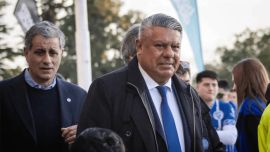We stand on the eve of the cusp of Argentina’s G20 year – the Leaders' Summit representing 85 percent of the world’s economy, bringing to a climax a process beginning last December when Argentina became this year’s host.
Once the summit ends, our country will be transferring the responsibility to Japan. Among other things, this makes President Mauricio Macri a member of the “Troika,” co-ordinating the G20 in the 2017-2019 period to facilitate the transition and transfer of experience between the three hosts. This year this troika has included Germany and Japan as Argentina’s predecessor and successor respectively in this continuing process. This gives our country a privileged role at the negotiating table – a responsibility indeed.
The G20 is a mechanism enabling the industrialised countries, and some emerging countries, to consult each other and co-operate in discussing issues of strategic interest and sometimes in resolving situations of extreme urgency, as in the 2008 financial crisis. It was this forum which globally co-ordinated the actions to moderate the effects of the crisis. From that moment the G20 Leaders Summit was born politically, replacing the model of ministerial co-ordination in exclusively economic and financial issues.
Critics of the group affirm that it is not as representative or inclusive as the United Nations, with its 193 voting members. True enough. That is why, alongside the full members, countries representing different geographies participate, for a broader participation and a more granular vision of the world. Not only are the big players here, like the United States, China, Russia or the European Union, but Argentina has also invited Chile, the Netherlands, Spain, Jamaica, Singapore, Senegal and Rwanda with the objective of incorporating diversity. In a word, it is not a group which exclusively represents Western industrialised economies but also huge percentage of world economic output, in addition including highly diverse degrees of development.
It should be stressed that this meeting of leaders is not just one moment in time but rather an arduous process of continuous work, discussion and approximation of visions between member and guest countries over the agenda proposed by the host country, as well as following up pending questions from previous periods. Even if the agreements reached carry no legal commitment, history shows a high degree of adherence and implementation on the part of all the signatories.
The Argentine Presidency has defined a constructive agenda at a time of strongly confronted world views. The key points of interest: the future of work, infrastructure for development and sustainable agriculture with new perspectives on gender. And for the first time a working group on education is included. All top priorities for our country, but at the same time this interest is shared by industrialised and emerging countries alike. Even minimal agreements open up the possibilities of advancing with a potential of high impact for the citizens of the world, who are represented in the agenda issues selected.
The efforts made by the Argentine working team this year have been significant. Not only economic and financial issues have been discussed but a broad agenda has been sought for a more harmonious vision of the world, incorporating working panels on the decisions adopted in the framework of the United Nations, such as the Agenda 2030 for Sustainable Development or Climate Change. This has broadened the discussion but in the current context has made it more difficult to reach convergence, given the rejection of multilateral systems by some countries.
There were 84 working meetings throughout the year in different cities to make the G20 process more federal.
The Buenos Aires Declaration sealing the agreements signed by the leaders will be the fruit of all these efforts. It must be admitted that the final success of an ambitious agreement is elusive given present reality. Nevertheless, the country has shown its attractions, its organisational and logistical skills and its leadership in the quest for convergence – a major political and diplomatic achievement which we should highlight.
This work might seem alien to the urgencies of Argentines immersed in the short term. Allow me to disagree. The agenda chosen covers issues which can and must change our reality along with the reality of the world in its totality. Being capable of recognising the profound interdependence of the local and the global is a prerequisite for finding better answers to our pending needs, highlighting the importance of participating in and influencing forums which, like the G20, set trends and give shape to global policies which condition the construction of a better world for everybody.























Comments